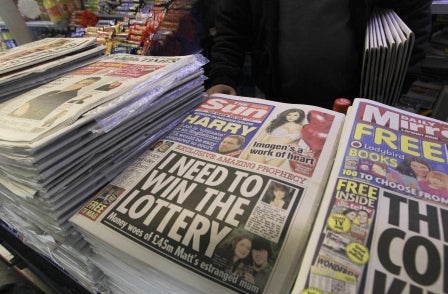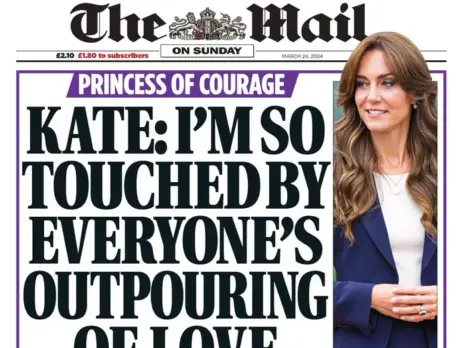
The Guardian appears to be the only newspaper to come out in support of Leveson’s controversial proposals for a new press regulator underpinned by statute.
Editor Alan Rusbridger told BBC Radio 4 this morning: "Our view is if you need a bit of statute to underpin that [incentives to join], to make it effective in the courts, that's something worth having. This big bogeyman of statute I don't think is there.
"I think about 80 per cent of it is right and can be agreed on", said Rusbridger, adding that it also offered "fantastic carrots" for membership such as a cheaper, more flexible way for the press and public to settle cases as well as "sticks".
The paper was less emphatic in its leader column this morning, questioning whether Ofcom should be involved in the regulation of the press.
“While statutory underpinning may be necessary to achieve the carrots and sticks needed to make the system work, there are reasons to be nervous about what's in the proposed statute,” it said.
It appeared to consider some form of statute was now inevitable, adding that “the drafting of the Leveson statute requires great care, real deliberation and cross-party support to avoid endless amendments and additions that move it from light touch to something more sinister”.
This is a departure from the paper’s earlier position on regulation.
In a 1 November leader the paper said: “Our own position remains as we argued it before the inquiry this summer. We believe in independent regulation, both from politicians and the press itself. We do believe in a contract system – not the use of statute – to secure participation.”
At the other end of spectrum was the Daily Mail, which wrote of its “grave reservations” over Leveson’s recommendations and the involvement of Ofcom, in particular.
“Sir Brian seems worryingly unable to grasp that once MPs and the media quango become involved, the freedom of the Press from state control will be fatally compromised for the first time since 1694,” it said.
“Though he assures us his regulator will be appointed by an independent panel, he doesn’t answer the burning question: who will appoint the panel?
“Isn’t there an acute danger that it will end up like so many public bodies, including Ofcom itself — stuffed with Blairites, on massive salaries, with a Left-leaning perception of what constitutes the public interest?”
The Mail also said Leveson’s suggestion that any publication that refuses to sign up to the new regulator should be made to pay the full costs of an ensuing civil court action – even if it wins the case – was “chilling”.
It would also meant that “for the first time, the principle of punishing the innocent would be enshrined in British law”.
It later accused Leveson of displaying an “other-worldly naivety that can only undermine public faith in his understanding of the issues at stake”.
His suggestion that police should be banned from talking to journalists off the record, for example, would mean that stories of “police corruption or incompetence” would never come to light, the Mail argued.
“He praises the Mail for bringing Stephen Lawrence’s killers to justice,” it said. “But if it weren’t for confidential briefings by senior officers, the guilty would still be at large.”
The Daily Telegraph said that while it agreed with Lord Justice Leveson on the importance of a free press, “where we part company with the learned judge… is in his belief that either of these two bulwarks of British liberty would be served by a regulatory body for newspapers that is underpinned by legislation”.
It, too, suggested that Leveson was naive when he insisted in yesterday’s press conference that that it would be “unfair” to characterise his proposals as statutory regulation.
“This is either sophistry or naivety on the judge’s part,” said the Telegraph, “since he has no idea what a Bill to underpin a new independent regulatory framework would look like when it emerged from Parliament”.
It continued: "How would it be drafted? How would the incentives and penalties for publications be framed? Could a definition of the public interest be bolted on? In other words, what is to stop MPs amending it now and in the future so that it no longer resembles the benign legislative vehicle envisaged by the judge?”
The paper concluded that “it would be wrong to use bad behaviour by the minority as an excuse to introduce the first press statute since censorship laws were abolished in 1695. Whatever the judge hopes, this would be a slippery slope to state meddling”.
Similar to the Telegraph, The Independent said it largely agreed with Leveson’s recommendations, but added: “Where we part company with Lord Justice Leveson is on the need for legislation – any legislation – to support the changes of principle and practice that are so patently required.”
The paper instead argued that any form of statute was both “unnecessary” and “undesirable”.
“One of Lord Justice Leveson's arguments was that only a statutory element would guarantee public confidence in any new watchdog,” it said. “That does not have to be so.
“It is by its operation, not its legislative underpinning, that it would be judged. And there was considerable irony yesterday in the fact that this position was defended most forcefully by none other than the Prime Minister – the very person who had set up the inquiry and was on record as committed to acting on its recommendations unless they were, in his word, ‘bonkers’."
The bulk of Lord Justice Leveson's recommendations, it argued, could be implemented without statutory underpinning.
The Financial Times took a similar line, outlining (£) its “grave reservations” over the involvement of Ofcom.
“The Financial Times has reservations about this approach. While there may be merit in a grand bargain that trades the incentives to participate for some measure of statutory underpinning, the idea of handing oversight power to Ofcom is wrong-headed,” it said.
“Ofcom is charged with regulating television broadcasters that have a legal obligation to impartiality. It reports directly to government. This is a step down the road towards state licensing of a press that, of course, has no obligation to provide balance.”
The paper was also worried about the proposal for a “backstop regulator”, arguing that it was a “press law by the back door”
“Whatever its recent failings, the press remains a cornerstone of our democracy,” it concluded. “This should not be forgotten.”
The Times praised Prime Minister David Cameron’s “courage" for his opposition to the statute-backed model.
“The independent regulation that the report advances does not require statutory underpinning,” it argued.
“Statute can be spurned while the scheme is embraced. Mr Cameron appreciated that in addition to being unnecessary, the proposed law would pose huge practical difficulties and breach the vital principle that Parliament should not take responsibility for the regulation of a free press.”
It concluded: “The industry now needs to come together quickly to agree how independent regulation will work. It also needs to consider how to guarantee its independence, which we have suggested could be by a panel appointed by the Lord Chief Justice.”
The Daily Express (editorial not online) followed the familiar pattern of praising some of Leveson’s recommendations and then adding a “but”, claiming the judge “enters very dangerous territory indeed in his recommendation that a law should passed by politicians to control the nature of this self-regulation”.
David Cameron’s challenge to the newspaper industry to devise its own regulatory system “that complies fully with the tough principles set Lord Leveson is “one we are happy to take up”, the Express said in a full-page editorial.
It added: “As the judge noted, too often the functioning of the PCC led to newspapers marking their own homework.
“No properly run newspaper should fear or resist genuinely independent checks and balances.”
The paper now fears that Labour will use the report as a “political football”, and warned: “What must never be allowed to occur is the emergence of powerful people who are in effect protected from scrutiny about the way they behave and who are able to
The Sun acknowledged that Leveson had been “rigorous in seeking the facts” and “has sought to be fair and objective”, but said it was “deeply alarmed by his main proposal for new legislation that could bring in State control of newspapers”.
“How ‘independent’ would a regulatory body be if it had to answer to MPs?” it asked. “Such a law could allow State officials to walk into papers like The Sun and censor stories.”
It told readers that “embarrassing and uncomfortable revelations about the establishment and the rich and powerful could easily be hushed up” it Leveson’s recommendations were accepted.
“From being an admired beacon of democracy, Britain will become a repressive symbol of secrecy.
“We understand why phone hacking victims want newspapers muzzled. But anger and the desire for revenge are not a basis on which to destroy 300 years of Press freedom.
Daily Mirror associate editor Kevin Maguire said Leveson was “dangerously naive on police relations with journalists, failing properly to appreciate properly how cops need papers to speak to the country’s finest detectives: the public”.
He added: “I’d wager more crimes are solved by witnesses coming forward after reading about offences than real life Barnabys or Tennisons collar with detective work.
“Equally the bid to control conversations between politicians and political hacks such as myself is doomed to fail.”
City AM editor Allister Heath made some interesting observations in his editor’s letter this morning.
Heath argued that “one of the saddest developments” of the inquiry was that “the political left’s leadership has officially given up on freedom”, adding: “Ed Miliband’s endorsement in its entirety of a report that he and his advisers cannot possibly have read and digested fully was a travesty.”
He also suggested that Nick Clegg’s “forefathers must be spinning in their graves”.
“There was a time when left-wingers were the most steadfast and honourable defenders of free speech and civil liberties; in the US, many of the most passionate defenders of freedom of expression are left-wing Democrats,” he said. “The contrast with Britain is stark.”
The New York Times also ran a leader on the inquiry saying the recommendations were “misplaced, excessive and potentially dangerous to Britain’s centuries-old traditions of a press free from government regulation”.
It noted that with the Officials Secrets Act and a “plaintiff-friendly libel law”, British newspapers “operate in a harsher legal environment than the American press”.
“Press independence is as essential a bulwark of political liberty in Britain as it is everywhere,” it added.
“That independence should not, and need not, be infringed upon now. Much of the conduct described in the report on Thursday — hacking into voice mail messages of ordinary citizens and illegally obtaining medical records — is not news gathering.
“They are illegal acts under British law. So are bribery, corrupt relations with police officials and political figures and other abuses attributed to the tabloid press.
“In such instances, newspapers can claim no shield against civil lawsuits or criminal prosecution. Those remedies, not government regulation, are the right ways to stop the kind of behavior alleged against The News of the World, and good deterrents against misconduct by other papers.”
*The Daily Star did not write an editorial on Leveson this morning.
Email pged@pressgazette.co.uk to point out mistakes, provide story tips or send in a letter for publication on our "Letters Page" blog







